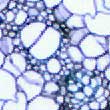Prokaryotic cells: the smallest, simplest cell type. The DNA is not housed within a nucleus.
These cells also have no chloroplasts or mitochondria. They do usually have
cell walls. Bacteria and archaebacteria are the only prokaryotic organisms.
Eukaryotic cells: a larger, more complex cell type unique to plants, animals, fungi, and protists.
The DNA is housed within a nucleus. Chloroplasts and mitochondria are found in eukaryotic
cells, though only plants and some protists will have chloroplasts (which are used for making food).
...
|
